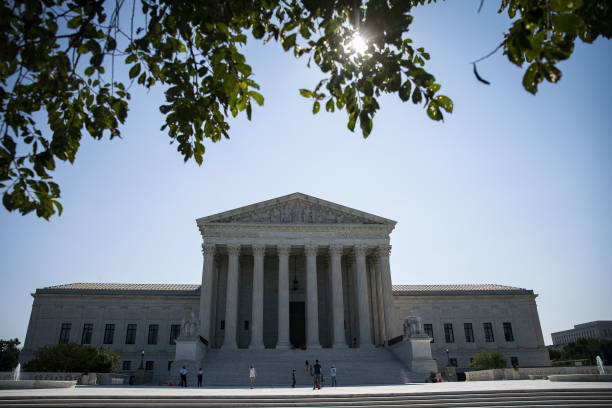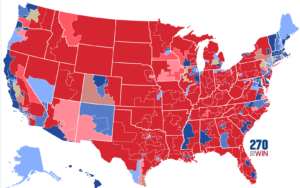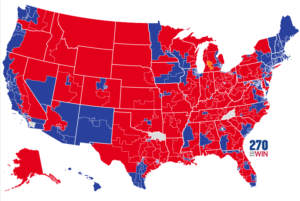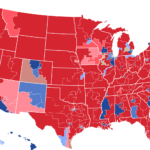The U.S. Supreme Court on Friday officially overturned Roe v. Wade, ending what was a nearly 50-year Constitutional precedent legalizing abortion nationwide. Predictably, there was wide-ranging reaction from all sides of the political spectrum. Democrats decried the decision, claiming the Supreme Court has unjustly taken away a woman’s right to choose and eviscerated 50 years of precedent. Republicans, on the other hand, applauded the decision, saying it was a concrete win for the pro-life movement and the unborn.
Now the question is, what will be the ramifications of this decision on the November Midterm Elections? Democrats face strong headwinds, with a struggling economy, high gas prices, and record inflation. President Joe Biden’s approval numbers have also been consistently underwater. These economic factors, in addition to the administration’s policy towards Afghanistan, Russia, Ukraine, immigration, crime, and several other factors, are all playing a part in the countries’ malaise. But despite this, will the overturning of Roe give Democrats a fighting chance in November? The short answer is probably not.
Americans’ View of the Country
The outcome of any Midterm Election starts and ends with Americans’ view of the country and the administration/political party in power. Democrats control the White House, Senate, and House of Representatives. To date, the nonpartisan polling service Real Clear Politics pegs the current direction of the country at 22.7% “Right Track” and 69.3% “Wrong Track.” This means nearly 70% of Americans feel the country is moving in the wrong direction with Democrats in power. For all the factors stated, this figure is not necessarily surprising. What might be more alarming for Democrats is the current Generic Congressional Ballot.
According to the same source, Republicans currently have a 3.4% advantage on this ballot (44.7% to 41.3%). From a historical perspective, Republicans led the generic ballot in June of 2010 with an average of around 2.5%. That year, Democrats lost 63 House seats and 6 Senate seats. The trend clearly displays ominous warning signs for the party in power. The big question is, can the overturning of Roe v. Wade cause people to reaccess their voting preferences come November? It’s certainly possible, but it can not be guaranteed seeing as the economy has been by far Americans’ biggest concern with the direction of the country.
2010 was a similar Midterm year to 2022 in that the economy was struggling coming off the Great Recession of 2008-2009. Inflation and gas prices were also similarly high. Despite efforts from then-President Barack Obama, the mood of the country could not be remedied in time to avoid what became a “Red Wave”. A similar scenario is playing out this year with Biden struggling to pass key (and in some cases any) parts of his agenda. What it may come down to is Americans’ perception of the importance of Roe v. Wade as a whole.
The Effect on One Issue Voters
One issue voters are simply those that vote on a singular issue, in many cases irrespective of party. Roe v. Wade may very well be the biggest test in recent memory of the power of these voters. Access to abortion and pro-choice policy are almost exclusively associated with the Democratic Party. So in theory, this should be a massive boon to them with large numbers of Americans supporting some abortion rights. The problem is the hierarchy of abortion in many voters’ minds. A recent Suffolk USA Today Poll showed that just 15% of likely voters believe abortion is the most important issue heading into November.
This would mean voters prioritizing abortion account for just 15% of likely Midterm voters, hardly enough to sway every swing state election. On the other hand, 66% of likely voters rate the economy as their most important issue when casting a ballot this year. The poll also suggests that Roe being overturned may not change how Americans vote in November, at least not enough to make a difference. 75% of those surveyed said the overturning of Roe v. Wade would have little or no effect on their decision to vote, inferring that many were already planning to vote because of other issues, most notably the economy.
So if the erosion of abortion rights in America is likely not going to push additional voters to the polls or change the minds of the ones already voting, what will it do? From a standpoint of affecting election results, the answer is probably very little. It will, however, cause much discussion and debate among the public. In addition, policy proposals will likely be put forth by elected officials in an attempt to address the issue state by state. Regardless, what’s certain is many Americans wholeheartedly disagree with one another over this issue.
Probable Midterm Outcome
The President’s Party generally loses 15-20 seats in a Midterm Election, and more if they are deeply unpopular like President Biden. Roe v. Wade being overturned will no doubt have an impact on this year’s election. Voters always cast their ballots when issues affect them directly, and obviously, Roe being overturned does just that for millions of Americans. The key question is, will it be enough to significantly change the likely electoral outcome in November? Based on most of the available data and reliable polls, the answer is no.
Republicans will, in all likelihood, gain anywhere between 25-35 House seats, and quite possibly more if the mood of the country does not markedly improve. In the Senate, there is a different dynamic afoot as individual brands are being put to the test in key swing states. The overturning of Roe is much more likely to affect a Senate race in Pennsylvania for example than one in Alabama. But even highly motivated voters in this battleground state probably won’t swing the Senate race seeing as just 15% of the entire country sees abortion as the most important issue heading into the Midterm Elections this year.
What Democrats nationally are hoping is a panacea for their approval number woes is probably nothing more than extended optimism. As stated, people will vote on the issues affecting them most, and contrary to other opinions, the state of the economy affects every voter in America. Abortion is definitely a hot topic, and it deserves all of the attention it gets. But Democrats would most certainly be doing a disservice to themselves and their party if they convince themselves that this one issue will save their hide in November.
The Roe v. Wade Roundup
When the Midterm Elections roll around, Americans will be voting based on a host of issues. The economy, inflation, gas prices, immigration, crime, and yes abortion will all be on the ballot. Democrats are going into the Midterms bruised, battered, and in many cases, deeply unpopular. Without serious intervention, they will lose and lose big. Issues like abortion have the possibility of injecting that shot of needed intervention for Democrats, but polling suggests that intervention simply will not overcome the headwinds Democrats face.
The squabble lawmakers engage in every day to craft policy their constituents approve of is well thought out and generally supports the logic that doing what their voters want will get them reelected. So, any Democratic in a district that leans Republican, is neutral, or even leans slightly to the left will have a very difficult time convincing their constituents to vote for them solely based on the issue of abortion. This is not to discount the issue at hand, but rather to say other issues (most definitely the economy) are at the very top of voters’ minds. But as they say, only time will tell how the Midterms shake out this November.
Main Photo from Getty.













